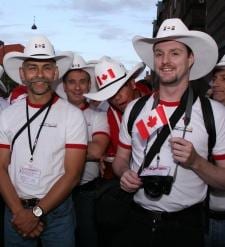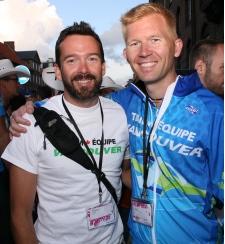
ALBERTANS IN DENMARK. Members of Team Calgary. Credit: Michael Luongo photo
The energy of Copenhagen’s Outgames was in the air from the moment I got onto my SAS flight, full of gay athletes. Best of all, my seatmate was Elizabeth Ziff, from the lesbian pop-rock band Betty, the group behind the theme song for The L-Word. “It’s gonna be rocking,” she told me. I was on my way to cover the events as a journalist and photographer and to run a workshop on media coverage of gay issues in the Middle East at the Outgames’ Human Rights Conference.
The Outgames was born out of a dispute over hosting the Gay Games in Montreal, but rather than give in when the events were taken from them by the International Federation of Gay Games, Montreal rose to the occasion, forming a new organization and creating the Outgames. It differs radically from the Gay Games with its three-part emphasis on sports, human rights and culture. I feel that while the sports are excellent, the emphasis on human rights, and the ability to meet hundreds of activists from all over the world in one setting is what makes the Outgames so special. At no other time in the world is there a larger, more important gathering of queer leaders.
The airport had a few Outgames greeters scattered about and attending a kiosk with information for lost gay travellers, but otherwise the gay presence wasn’t so obvious. Hitting town gave a stronger impression of the Games about to begin — rainbow flags and banners adorned the city’s main streets.
“We made a conscious decision to hold events in the center of the town, rather than in stadiums far outside, so that locals could make a choice to come to the events and be part of them, whether they were gay or not,” said Outgames’ CEO Uffe Elbaek at a press conference. “We wanted to bring the events to the people.”
Registration itself was one of the clearest examples of this: all the paperwork was taken care of at the Tivoli Gardens in Hans Christian Andersen Hall, one of the city’s most iconic tourist sites, and named for Denmark’s most famous citizen, a man whose ambiguous sexuality has long been considered a part of the country’s gay history.
The Opening Ceremony in Town Hall Plaza was a lively affair for thousands, with the athletes and conference attendees lining up aside the Town Hall, a massive brick and granite, neo-medieval structure with a clock tower rising from its gabled roof. The atmosphere was intensely festive, in spite of the cool temperatures and looming thunderclouds. Many of the athletes waved their nation’s flags, a global mix united by rainbow flags glowing against the grey sky.
“I am really, really, excited to be here,” Team Vancouver member and yoga competitor Dean Nelson told me. “The event is quite dynamic and the city is just gorgeous.”
Dan Quon, the president of Team Vancouver and a track and field competitor, said he was happy to “see old faces and people I haven’t seen before on the track.” He felt the events had a different feeling from Montreal, commenting, “it’s a different city, and the venues are smaller,” but the advantage is that “it’s more intimate and you get to see more people, good for interaction.” Only about 5,500 athletes are in Copenhagen, a little more than half of what was in Montreal. The worldwide economic crisis was everyone’s boogeyman.
Team Montreal was waiting to lead the parade onto the stage and member Martin Malo, a triathlon competitor, said, “it’s going to be as fun as it was in Montreal, but different because I am a guest. I am going to experience this from a different side.” Winner of a gold medal in the triathlon in 2006, his happiness had a slight apprehension as he added, “I have a lot of pressure on me this time.”
By the time the athletes reached the stage, it was obvious this was a much smaller Outgames than Montreal, but the diversity was just as intense, with parade-goers from Botswana, Jamaica, Nepal and many other developing countries in the mix. It was a strong visual for what Lord Mayor Ritt Bjerregaard in her speech said was part of the Outgames’ goals, to be able to “to love whomever we are in love with and to show it openly.” She called on everyone who attended to “leave the city as true citizens of Copenhagen, that means going by values of respect of diversity and freedom.”
Shortly after she spoke, the rain clouds burst, showering the stage, but the beautiful show continued, with circus artists like Anders Astrup Jensen and others suspended over the stage using ropes, metal bars and billowing white sheets that fluttered like angels wings. Two of the men, performing as couple, held onto each other’s muscular bodies, hugging and at times kissing. Their act, all the more precarious and dangerous in the heavy rainfall, demonstrating beautifully the challenge of same-sex couples in the real world; that in spite of all the adversity thrown at them, such love will continue. The downpour ended and the crowd dispersed, as people made their way to parties all across the city.
I won’t be able to see everything during the week — there’s too much to do, and I won’t be here the whole time. I have found though in just my few brief days that the camaraderie of the athletes is astounding, whether chatting as they wait to compete or at the after parties all over town. At the Human Rights Conference, it’s also easy to talk with activists the world over, some from places where gay rights issues seem advanced, like Western Europe and the United States, to activists from Africa, Asia and the Middle East, where things are a struggle. Copenhagen’s Outgames have proven to be as amazing an experience as the 2006 events in Montreal. I am glad the Games have begun.

 Why you can trust Xtra
Why you can trust Xtra


